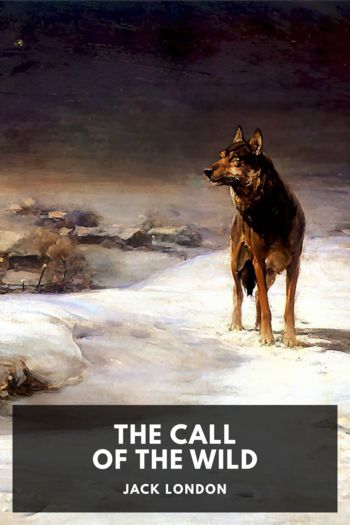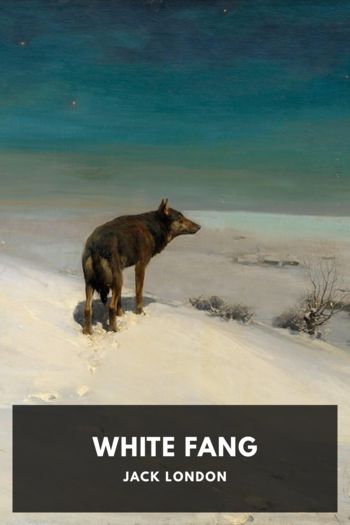The Call of the Wild by Jack London (world best books to read TXT) 📕

Description
Jack London spent nearly a year in Alaska and the Klondike, mining for gold and braving the Alaskan winter. There he was inspired to write what would become The Call of the Wild, one of his most famous novels. The Call of the Wild tells the tale of a domesticated dog stolen from his California family and sold to sledders in Alaska. As he adapts to the harsh and wild environment, he slowly sheds domestication and returns to his primal roots.
The Call of the Wild was London’s first major success, ensuring he’d have a readership for his future writing and paving the way for him to become one of the first writers to amass a fortune from just his fiction.
Read free book «The Call of the Wild by Jack London (world best books to read TXT) 📕» - read online or download for free at americanlibrarybooks.com
- Author: Jack London
Read book online «The Call of the Wild by Jack London (world best books to read TXT) 📕». Author - Jack London
To Buck’s surprise these dogs manifested no jealousy toward him. They seemed to share the kindliness and largeness of John Thornton. As Buck grew stronger they enticed him into all sorts of ridiculous games, in which Thornton himself could not forbear to join; and in this fashion Buck romped through his convalescence and into a new existence. Love, genuine passionate love, was his for the first time. This he had never experienced at Judge Miller’s down in the sun-kissed Santa Clara Valley. With the Judge’s sons, hunting and tramping, it had been a working partnership; with the Judge’s grandsons, a sort of pompous guardianship; and with the Judge himself, a stately and dignified friendship. But love that was feverish and burning, that was adoration, that was madness, it had taken John Thornton to arouse.
This man had saved his life, which was something; but, further, he was the ideal master. Other men saw to the welfare of their dogs from a sense of duty and business expediency; he saw to the welfare of his as if they were his own children, because he could not help it. And he saw further. He never forgot a kindly greeting or a cheering word, and to sit down for a long talk with them (“gas” he called it) was as much his delight as theirs. He had a way of taking Buck’s head roughly between his hands, and resting his own head upon Buck’s, of shaking him back and forth, the while calling him ill names that to Buck were love names. Buck knew no greater joy than that rough embrace and the sound of murmured oaths, and at each jerk back and forth it seemed that his heart would be shaken out of his body so great was its ecstasy. And when, released, he sprang to his feet, his mouth laughing, his eyes eloquent, his throat vibrant with unuttered sound, and in that fashion remained without movement, John Thornton would reverently exclaim, “God! you can all but speak!”
Buck had a trick of love expression that was akin to hurt. He would often seize Thornton’s hand in his mouth and close so fiercely that the flesh bore the impress of his teeth for some time afterward. And as Buck understood the oaths to be love words, so the man understood this feigned bite for a caress.
For the most part, however, Buck’s love was expressed in adoration. While he went wild with happiness when Thornton touched him or spoke to him, he did not seek these tokens. Unlike Skeet, who was wont to shove her nose under Thornton’s hand and nudge and nudge till petted, or Nig, who would stalk up and rest his great head on Thornton’s knee, Buck was content to adore at a distance. He would lie by the hour, eager, alert, at Thornton’s feet, looking up into his face, dwelling upon it, studying it, following with keenest interest each fleeting expression, every movement or change of feature. Or, as chance might have it, he would lie farther away, to the side or rear, watching the outlines of the man and the occasional movements of his body. And often, such was the communion in which they lived, the strength of Buck’s gaze would draw John Thornton’s head around, and he would return the gaze, without speech, his heart shining out of his eyes as Buck’s heart shone out.
For a long time after his rescue, Buck did not like Thornton to get out of his sight. From the moment he left the tent to when he entered it again, Buck would follow at his heels. His transient masters since he had come into the Northland had bred in him a fear that no master could be permanent. He was afraid that Thornton would pass out of his life as Perrault and François and the Scotch halfbreed had passed out. Even in the night, in his dreams, he was haunted by this fear. At such times he would shake off sleep and creep through the chill to the flap of the tent, where he would stand and listen to the sound of his master’s breathing.
But in spite of this great love he bore John Thornton, which seemed to bespeak the soft civilizing influence, the strain of the primitive, which the Northland had aroused in him, remained alive and active. Faithfulness and devotion, things born of fire and roof, were his; yet he retained his wildness and wiliness. He was a thing of the wild, come in from the wild to sit by John Thornton’s fire, rather than a dog of the soft Southland stamped with the marks of generations of civilization. Because of his very great love, he could not steal from this man, but from any other man, in any other camp, he did not hesitate an instant; while the cunning with which he stole enabled him to escape detection.
His face and body were scored by the teeth of many dogs, and he fought as fiercely as ever and more shrewdly. Skeet and Nig were too good-natured for quarrelling—besides, they belonged to John Thornton; but the strange dog, no matter what the breed or valor, swiftly acknowledged Buck’s supremacy or found himself struggling for life with a terrible antagonist. And Buck was merciless. He had learned well the law of club and fang, and he never forewent an advantage or drew back from a foe he had started on





Comments (0)